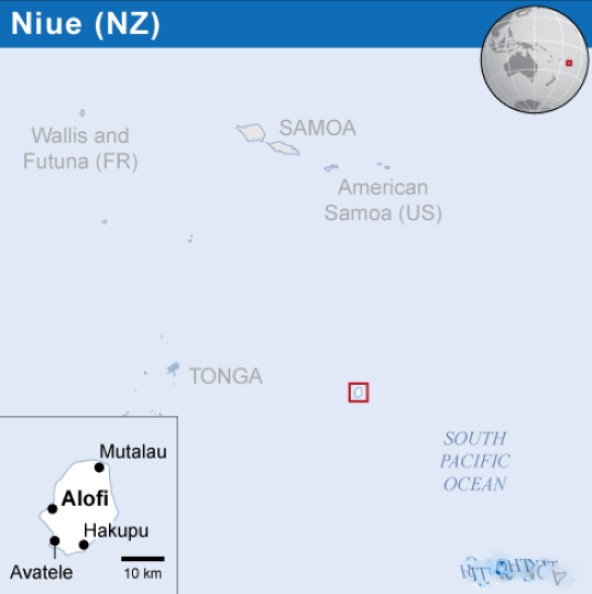
Niue
International Disaster Response Law in the Pacific
Overview

Legal Preparedness for International Assistance Assessment
1. Does Niue have a clear legal framework for disaster risk management which includes procedures relating to international disaster assistance?
Niue lacks a detailed process for assessing and processing requests for international assistance, however a basic framework exists. The 2004 regulations provide a limited legal framework by requiring that “all relief supplies, equipment and other items brought into Niue for the [sic] Government distribution shall only be released upon written authorisation from the appropriate Minister”.
Beyond this, the 2010 NDP also implies that the NEOC should, as part of its planning responsibilities, play the key co-ordinating role as regards international assistance. This requires that the NEOC collate a register and “identify gaps in needs that cannot be meet by Niue resources and communicate this to the Emergency Executive Group”. The EEG is then responsible for recommending to cabinet whether international assistance is required.
The plan also creates the position of International Assistance Co-ordinator (IAC) who is charged with “managing and co-ordinating the requests of, international assistance following a disaster”. Such an individual must be given the approval of cabinet to make such assistance. The plan also states that the “key co-ordinators for implementing international assistance are contained within the NEOC”. However, no further details are provided as to who these individuals are or how the process is to operate in practice.
2. Do Niue’s laws and regulations clearly set out a focal point for coordinating international disaster assistance?
The NDP sets out that the EEG within the National Disaster Management Office is to coordinate international assistance. The International Assistance Co-ordinator (IAC) is responsible for managing and co-ordinating the requests for, and receipt of, international assistance following a disaster.
3. Do Niue’s laws and regulations outline the roles and responsibilities of different institutions relating to international disaster assistance?
The National Disaster Plan sets out a brief schedule of responsibilities for the provision of international assistance. This is laid out below:
-
EEG: Track internal requests for assistance that cannot be met with internal resources. Recommend to Cabinet as to whether international assistance may be required. Ensure that incoming international assistance and supplies are applied appropriately and transparently. Provide information on relief and international assistance to Cabinet and other relevant organisations.
-
Cabinet: Request international assistance using appropriate channels (may be delegated to a Minister)
-
The Director’s Customs and Quarantine: Make necessary arrangements for the clearance of all donor assistance.
-
Police: Provide onshore security of international relief supplies until aid is able to be distributed.
4. Do Niue’s laws and regulations outline a process for requesting/welcoming offers of international disaster assistance, and for terminating international assistance?
The National Disaster Plan sets out a limited process for international assistance as outlined above. The key responsibility lies with the EEG which tracks requests for assistance that cannot be met with internal resources and recommends to Cabinet what international assistance is required. The EEG must also ensure that incoming international assistance and supplies are “applied appropriately and transparently” as well as “provide information on relief and international assistance to Cabinet and other relevant organisations”. Aside from this general responsibility, the exact processes for requesting or welcoming external assistance are not provided in the plan.
Specific requests for international assistance must be made by Ministers during a declared emergency, although the NDP provides that this be delegated to a specific Minister (the IAC). The NDP makes clear the IAC’s role as the key person responsible for managing requests for, and receipt of, international assistance. The IAC responsibilities are:
• Assist planning/ intelligence in assessing gaps in meeting community needs.
• Request international assistance to meet gaps unable to be filled by Niue resources.
• Request an UNDAC assessment team.
• Request a SOPAC team to conduct a post-disaster impact assessment.
Beyond this the NDP provides that the Directors of Customs and Quarantine are to make “necessary arrangements” for the clearance of all donor assistance but gives no details as to what such arrangements are or how they should be implemented. According to the NDP, the police’s role is limited to securing such relief supplies.
5. Do Niue’s laws and regulations provide for necessary legal facilities to be provided to international assisting actors?
Niue has no specific legislation relating to legal facilities for assisting actors, however discretion exists for the Niuean government to provide exemptions from immigration, customs and some regulatory requirements as set out below.
The Immigration Act 2011 provides that a permit must be held in order for an individual to remain in Niue lawfully. There are no specific provisions for international assisting actors to be exempt from such requirements. However the Act provides that the Chief Immigration Officer may grant any person a temporary permit. The temporary permit that may apply to international assisting actors are work permits for persons intending to undertake employment or provide any services in Niue. The application for a temporary permit must occur as the person immediately arrives in Niue. As part of the free association agreement, NZ citizens (without Niuean heritage) are able to enter Niue for up to 30 days on a visitor permit. NZ citizens with Niuean heritage (as recorded on their passport) may enter without restriction.
The Visiting Forces Act 1939 and the Immigration Act 2011 provide that the armed forces of Commonwealth countries are exempt from standard immigration requirements. The Civil Aviation Act 1999 gives the Director the discretion to exempt a person, aircraft, aeronautical product, or aviation related service from a requirement contained in regulations contained in the Act if the Director considers it appropriate; and it is not specifically provided by the regulations that exemptions are not to be granted.
The Customs Tariff Act 1982 provides that Cabinet is empowered to make exemptions for payment of duties or to substitute reduced rates of duties.
6. Do Niue’s laws and regulations set out quality standards for international assisting actors?
The Public Emergency Act 1979 provides that when a proclamation of emergency is in force, all relief supplies, equipment and other items brought into Niue for the Government distribution shall only be released upon written authorisation from the appropriate Minister. However, beyond this political limit, no specific requirements for quality standards are provided in the disaster law framework.
7. Do Niue’s laws and regulations set out eligibility requirements for international assisting actors to receive legal facilities?
As no specific legal facilities are provided for assisting actors, no eligibility requirements exist.
8. Do Niue’s laws and regulations establish a specialized unit for expediting the entry of international disaster assistance?
No specific agency is provided with the authority to undertake this task. The Strategic Roadmap for Emergency Management sets out emergency management as an integrated sector, with the Police, Airport Fire/Rescue, Community, and the National Disaster Management Office all operating out of the Joint Emergency Operations Centre. The Strategic Roadmap aims to create a physical location for all primary response agencies alongside the National Emergency Operations Centre. Given the role for the NEOC in the NDP it is assumed that this would operate as a single base for incoming assistance but such a role is not explicit.
9. Do Niue’s laws and regulations provide adequate transparency, safeguards and accountability mechanisms governing international disaster relief and initial recovery assistance? In particular the following will be assessed:
The National Disaster Relief Fund Act 1980 provides a legal framework for donations and contributions received in a national disaster. These include contributions by foreign governments (and that of Niue), private organisations and individuals (both domestic and international) and returns from investments.
These resources are to be placed in a hypothecated fund which can be used for the repair of damage suffered to public property during a national disaster and the immediate provision of financial and other assistance to victims of national disasters. Expenditure requires the approval of the Financial Secretary. The Fund must be regularly audited.
The Public Emergency Act 1979 also provides that when a proclamation of emergency is in force, all relief supplies, equipment and other items brought into Niue for the Government distribution shall only be released upon written authorisation from the appropriate Minister.
10. Do Niue’s laws and regulations outline procedures for international disaster assistance sent from and transiting through Niue?
The current regulatory framework does not explicitly provide for international assistance originating from or transiting through Niue.
Laws, policies, plans and other resources
-
Public Emergency Act 1979
-
Public Emergency Regulations 2004
-
National Disaster Relief Fund Act 1980
-
Immigration Act 2011
-
Civil Aviation Act 1999
-
Communications Act 1989
-
Customs Tariff Act 1982
-
Visiting Forces Act 1939
-
National Climate Change Policy 2009
-
National Strategic Plan 2009–2013
-
National Strategic Plan 2016–2026
-
National Disaster Plan 2010
-
Joint National Action Plan for Disaster Risk Management and Climate Change 2012
-
Sustainable Coastal Development Policy 2008
-
Strategic Roadmap for Emergency Management in Niue 2015–2019
![]()

